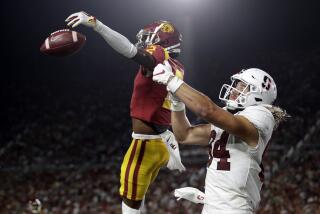TCU’s Wacker Praised for Dismissing Players for Taking Payments
- Share via
FORT WORTH — Late on the morning of Sept. 21, Jim Wacker’s normally sunny countenance had taken on an appearance of gloom.
His Texas Christian University team, decimated by a decision he made less than 48 hours earlier, was about to play Kansas State--a game in which the Horned Frogs were heavily favored but barely won.
The players were in a mild state of shock. TCU’s name had been spread distastefully across the nation’s newspapers. Wacker, who almost never needs something to lift his spirits, needed something now.
Moments before kickoff, that something came from Bud Wilkinson--the venerable former coach at Oklahoma who now spends Saturdays in television booths around the country.
Wilkinson walked up to Wacker, hugged him and said: “You made a monumental decision for the betterment of the game. It is something that I don’t know if I could have done.”
It has been a tumultuous time for Wacker, who in 1984 guided TCU to its best football season in 25 years. His dismissal of seven players for taking payments from alumni undercut a squad that was expected to contend in the Southwest Conference.
The scores of TCU games quickly reverted to the way they were before Wacker’s arrival on campus--Southern Methodist 56, TCU 21; Arkansas 41, TCU 0; Rice 34, TCU 27; Baylor 45, TCU 0.
But through it all Wacker has been sustained by the certainty that he has done the right thing and by the manner in which fans and his fellow coaches stood behind him.
“I wish to compliment you on your swift and decisive action,” wrote Notre Dame president Father Edmund Joyce. “You have set a standard for other coaches and administrators to follow.”
Minnesota coach Lou Holtz called Wacker and told him: “I never doubted for a second what you would do. I promise you that it was the right decision, the only decision. It’s a decision that you and your football team will be happy to live with for the rest of your lives.”
“Jim, it didn’t surprise me a bit as soon as I saw what you had done,” former Georgia Tech coach Bobby Dodds said in a letter. “I already knew your beliefs and principles, and have always agreed with you every step of the way. College football needs more people just like you.”
Such comments--by telephone and through the mail--poured in during the weeks following the dismissals.
“It was important to me that so many of the calls and letters came from established coaches,” Wacker said. “There was Ken Hatfield, Darrell Royal, Lou Holtz, Joe Paterno, Bo Schembechler.
“Those are meaningful to me. I guess we’ve had 600 letters and I don’t know how many phone calls. Graduates of every college in the Southwest Conference have written and said they appreciated the stand we took.”
Wacker insists it is the coaches who must take the lead in reducing the number of recruiting scandals.
“Let’s face it,” he said. “The only people who can clean it up are the coaches.
“This business involves three groups--the coaches, the alumni and the players who have their hands out. All three have to take the blame. But the only person who can do anything about it is the coach. And it’s got to be done. We’re destroying too many young men’s value systems.
“I’m not going to try to answer for anybody else. All I can say is that we did what we said we would do from day one. We said we would turn ourselves in to the NCAA, identify the alumni involved and dismiss the players. Every player who has been here has heard me say that.”
Some of the dismissed players have petitioned the NCAA to be reinstated. Running back Kenneth Davis hired an agent and tried to get the NFL to hold a special draft just for him.
“That has been one of the hardest parts of it for me,” Wacker said of the players’ reaction. “But there are outside influences at work there.
“I think I’ve become a tougher person through this. I’ve read a lot of stuff and I’ve had to decide that I’m not going to worry about what the papers say.”
More to Read
Go beyond the scoreboard
Get the latest on L.A.'s teams in the daily Sports Report newsletter.
You may occasionally receive promotional content from the Los Angeles Times.










